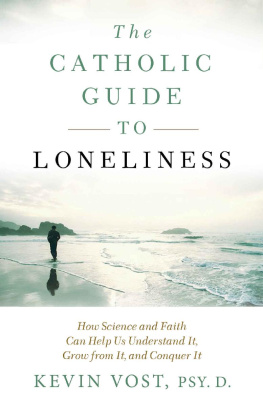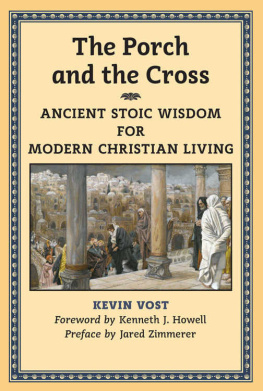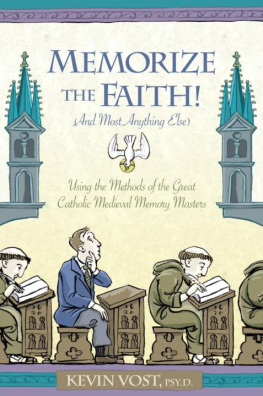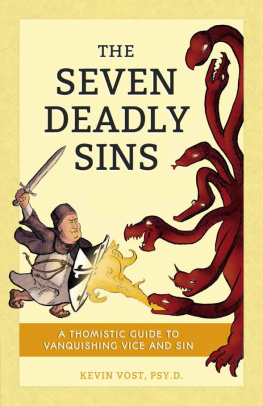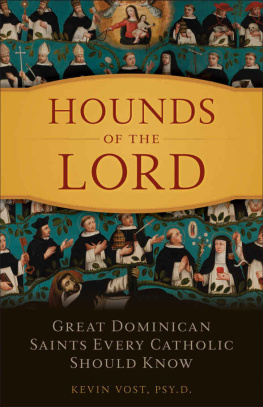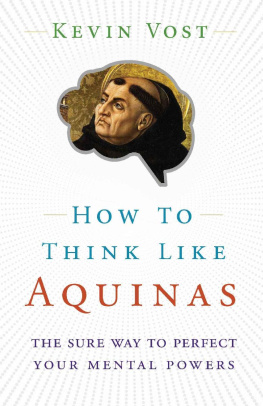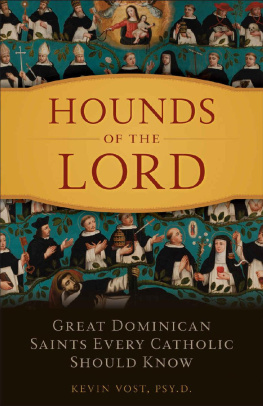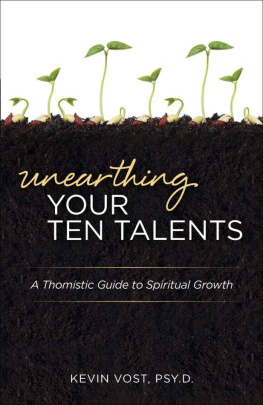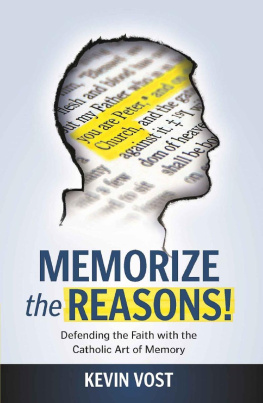Kevin Vost - Catholic Guide to Loneliness
Here you can read online Kevin Vost - Catholic Guide to Loneliness full text of the book (entire story) in english for free. Download pdf and epub, get meaning, cover and reviews about this ebook. year: 2017, publisher: Sophia Institute Press, genre: Religion. Description of the work, (preface) as well as reviews are available. Best literature library LitArk.com created for fans of good reading and offers a wide selection of genres:
Romance novel
Science fiction
Adventure
Detective
Science
History
Home and family
Prose
Art
Politics
Computer
Non-fiction
Religion
Business
Children
Humor
Choose a favorite category and find really read worthwhile books. Enjoy immersion in the world of imagination, feel the emotions of the characters or learn something new for yourself, make an fascinating discovery.
- Book:Catholic Guide to Loneliness
- Author:
- Publisher:Sophia Institute Press
- Genre:
- Year:2017
- Rating:3 / 5
- Favourites:Add to favourites
- Your mark:
- 60
- 1
- 2
- 3
- 4
- 5
Catholic Guide to Loneliness: summary, description and annotation
We offer to read an annotation, description, summary or preface (depends on what the author of the book "Catholic Guide to Loneliness" wrote himself). If you haven't found the necessary information about the book — write in the comments, we will try to find it.
Catholic Guide to Loneliness — read online for free the complete book (whole text) full work
Below is the text of the book, divided by pages. System saving the place of the last page read, allows you to conveniently read the book "Catholic Guide to Loneliness" online for free, without having to search again every time where you left off. Put a bookmark, and you can go to the page where you finished reading at any time.
Font size:
Interval:
Bookmark:
Other books by Kevin Vost
from Sophia Institute Press:
Memorize the Faith!
Fit for Eternal Life!
The One-Minute Aquinas
Unearthing Your Ten Talents
The Seven Deadly Sins
Hounds of the Lord
The Seven Gifts of the Holy Spirit
Kevin Vost, Psy.D.
The
CATHOLIC GUIDE
TO
LONELINESS
How Science and Faith
Can Help Us Understand It,
Grow from It, and Conquer It
SOPHIA INSTITUTE PRESS
Manchester, New Hampshire
Copyright 2017 by Kevin Vost
Printed in the United States of America.
All rights reserved.
Cover design by LUCAS Art & Design, Jenison, MI.
Cover image courtesy of Masterfile Images.
Biblical references in this book are taken from the Catholic Edition of the Revised Standard Version of the Bible, copyright 1965, 1966 by the Division of Christian Education of the National Council of the Churches of Christ in the United States of America. Used by permission. All rights reserved.
Excerpts from the Catechism of the Catholic Church , second edition, 2000 by Libreria Editrice Vaticana-United States Conference of Catholic Bishops, Washington, D.C. All rights reserved. Used with permission.
No part of this book may be reproduced, stored in a retrieval system, or transmitted in any form, or by any means, electronic, mechanical, photocopying, or otherwise, without the prior written permission of the publisher, except by a reviewer, who may quote brief passages in a review.
Sophia Institute Press
Box 5284, Manchester, NH 03108
1-800-888-9344
www.SophiaInstitute.com
Sophia Institute Press is a registered trademark of Sophia Institute.
Library of Congress Cataloging-in-Publication Data
Names: Vost, Kevin, author.
Title: The Catholic guide to loneliness : how science and faith can help us
understand it, grow from it, and conquer it / Kevin Vost, Psy.D.
Description: Manchester, New Hampshire : Sophia Institute Press, 2017. |
Includes bibliographical references.
Identifiers: LCCN 2017030001 | ISBN 9781622824144 (pbk. : alk. paper) ePub ISBN 9781622824151
Subjects: LCSH: Loneliness Religious aspects Catholic Church.
Classification: LCC BV4911 .V67 2017 | DDC 155.9/2 dc23 LC record available at https://lccn.loc.gov/2017030001
To all who are lonely and all who reach out
to lighten the load of their neighbors loneliness
Contents
Conclusion:
About the Author: Kevin Vost
Chapter 1
Rethinking and Relieving Loneliness
When I was a child, I spoke like a child. I reasoned like a child. When I became a man, I gave up childish ways.... Brethren, do not be children in your thinking; be babes in evil, but in thinking be mature. 1 Corinthians 13:11; 14:20Grown-Up Thinking about Loneliness
Loneliness is a product of our God-given human capacity to think and reflect about things. It is defined as a perceived social isolation. Note the importance of the word perceived . We feel lonely when we think there is a discrepancy between the social connectedness we would like to have and that which we do have. This is not to say that loneliness is all in ones head, something to be dismissed or ignored, since the lonely persons perception of a serious lack in social connection may be very accurate indeed. A quarter of the adults queried in a 2004 study reported that they had no one to confide in about serious matters. So, if you or I are feeling lonely, this may in no way imply that we are engaging in the kind of childish thinking that St. Paul has warned about. There may be many valid reasons for us to feel lonely, but what may be childish, or at least inaccurate, distressing, and self-defeating, in our thinking is how we proceed to think about the fact of our loneliness.
There could be a literally childish component to our thinking if our current experience of loneliness harks back to parental bonding and attachment difficulties in early childhood or perhaps to a sense of rejection from peers or even bullying later on. Still, as cognitive psychotherapists would start to argue in the 1950s and 1960s, and continue to argue, even when some childhood experiences seem to be causing us emotional distress as adults, the reason these experiences have the power to do so is because of how we think and talk to ourselves about those events today.
The ways we are accustomed to thinking about and talking to ourselves about negative events in our lives will determine, to a great extent, how much those events even the kinds of personal loss or isolation that may leave us prey to loneliness distress or immobilize us. To think like an adult about the experience of loneliness, we must ask ourselves, Okay, so Im lonely, now what am I going to do about it? Well, Im glad you asked yourself, since thats exactly what the rest of this book is about!
The ABCs of Lonely Thinking
Maladaptive social cognition refers to the kinds of thinking about social situations that tend to produce distress and make people less able to act in appropriate ways that can encourage engagement and connection with others.
Consider this hypothetical incident relevant to loneliness. How do you feel? Embarrassed perhaps and saddened that you have been shunned? There is nothing unusual here, and it would seem to illustrate clearly a simple stimulus-response psychology. The stimulus (Sallys snub) has triggered your emotional response (embarrassment, sadness, perhaps even anger at Sally, and a sense of rejection and loneliness as well). Still, was it as simple as that?
Are we really black boxes, as many behaviorists suppose? Important things go on inside an organism between a stimulus and a response. In animals this would be instinct. In humans the intervening factor would be our abilities to think, to evaluate, and to talk to ourselves about the various stimuli we encounter through events in the world. After all, not every person reacts the same way to the same events.
In the world of psychotherapy, the greater awareness of the power of human thought or cognition gave rise in the 1960s to cognitive therapy, which holds, for example, that a key component of depression is the way depressed people bring and keep themselves down by consistently thinking in negative ways about their selves , the world , and the future. By ferreting out and changing such patterns of thinking, depression can sometimes be quite successfully treated.
Shortly before this, in the mid-1950s, psychologist Albert Ellis had pioneered his Rational Therapy, later to be called Rational-Emotive Behavior Therapy (REBT). His most popular and influential early books on the subject included A Guide to Rational Living , first published in 1961, and Reason and Emotion in Psychotherapy in 1962. In the early 1960s, Ellis applied his theories to all kinds of mental disorders and emotional distresses. He boiled down countless problems to their simple ABCs.
Let S (the stimulus) be A (an activating event ), and let R (the response) be C (the emotional/behavioral consequence ).
Stimulus = Actuating event
Response = Consequence (emotional/behavioral)
When Sally passes by ( A ) and we are embarrassed or sad or angry ( C ), we tend to act as if A caused C but Ellis points out the often-neglected but most important causal factor. Let the activities of the organism ( O ) be represented here by B (our beliefs ).
Stimulus = Actuating event
Us = Beliefs
Response = Consequence (emotional/behavioral)
Sally did not cause us to feel a certain way. We caused those feelings ourselves!
How can we show this? Lets say, for example, that as you walk on, all disgruntled, you see Sally getting out of her car on your side of the street, and she beams you a smile and calls you over. Oops! That person you had waved to wasnt Sally after all. Are you still sad or mad at her?
Next pageFont size:
Interval:
Bookmark:
Similar books «Catholic Guide to Loneliness»
Look at similar books to Catholic Guide to Loneliness. We have selected literature similar in name and meaning in the hope of providing readers with more options to find new, interesting, not yet read works.
Discussion, reviews of the book Catholic Guide to Loneliness and just readers' own opinions. Leave your comments, write what you think about the work, its meaning or the main characters. Specify what exactly you liked and what you didn't like, and why you think so.

